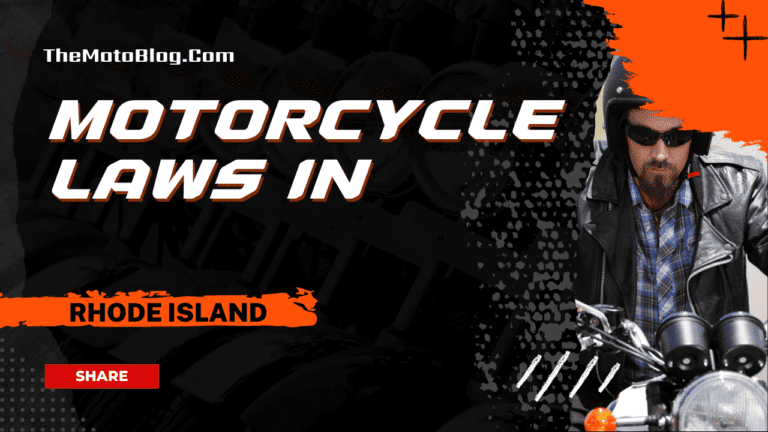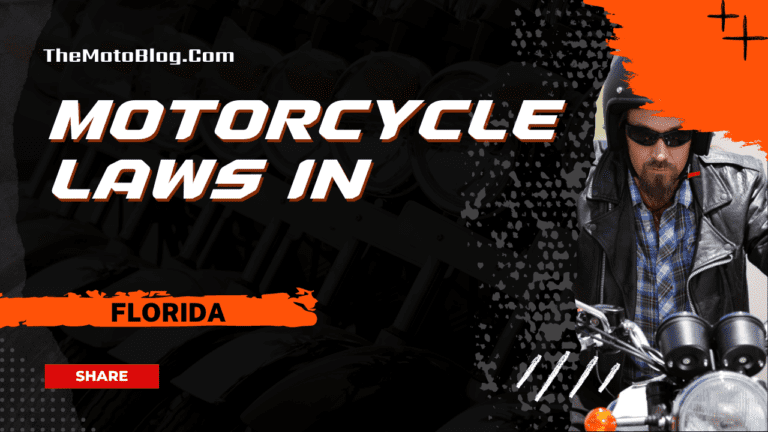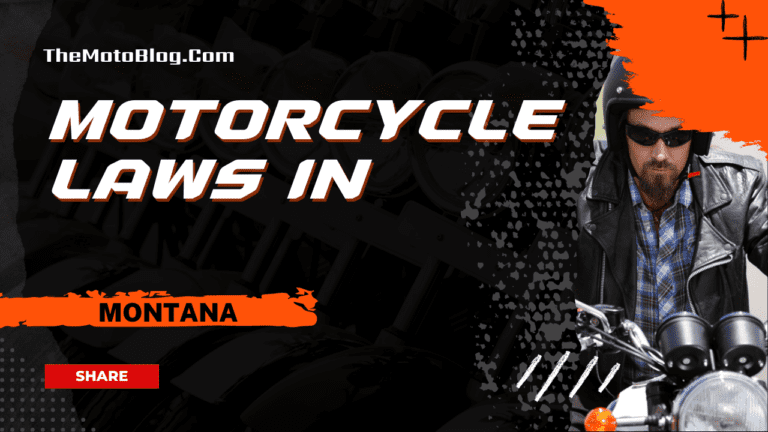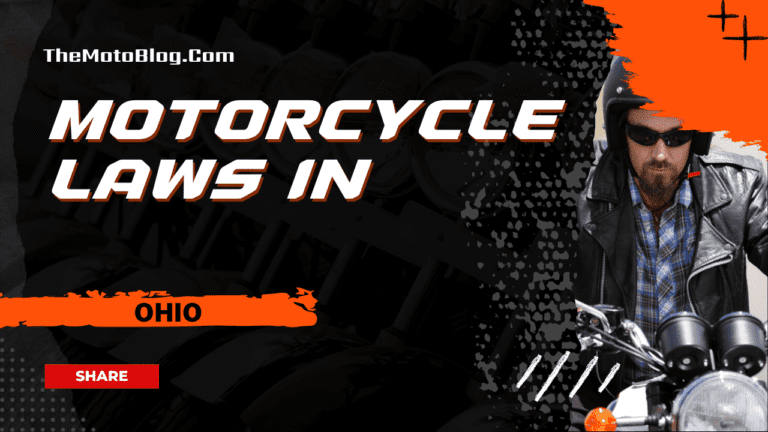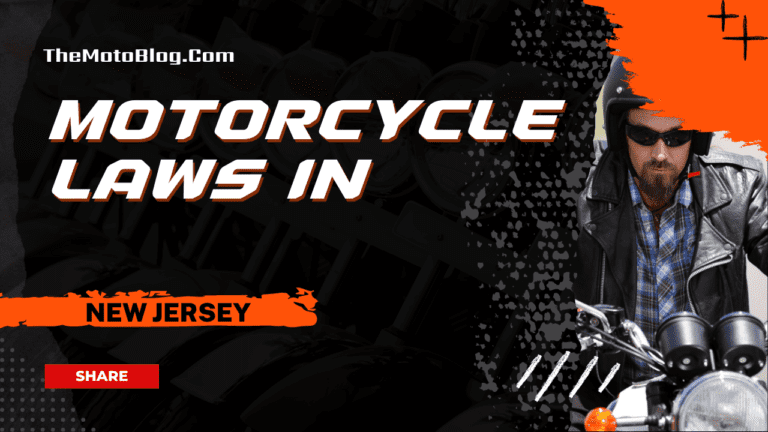Motorcycle Laws in West Virginia: A Comprehensive Breakdown for Enthusiasts
Navigating the winding roads of West Virginia on a motorcycle can be a thrilling experience. However, it’s important to bear in mind the specific laws governing motorcycle use in this state. West Virginia has its own unique set of rules for riders that are designed to keep everyone safe on the road.
Firstly, helmet laws. In West Virginia, you’re required by law to wear a helmet while riding a motorcycle. This isn’t just about personal safety – it’s about legal compliance as well. Additionally, eye protection is mandatory unless your bike is equipped with a windscreen or windshield that meets certain specifications.
The above-mentioned laws are just the tip of the iceberg when it comes to motorcycling laws in West Virginia. There are many other requirements and restrictions that may impact how and when you ride your bike within state borders.
Key Takeaways
- Riding a motorcycle in West Virginia requires adherence to state-specific laws.
- Helmets are mandatory for all riders in West Virginia, regardless of age or experience.
- Eye protection is required unless the motorcycle has a windscreen.
- Insurance requirements in West Virginia do not obligate motorcyclists to have liability coverage, unlike many other states.
- Lane splitting (riding between lanes of slow-moving traffic) is prohibited by law in West Virginia.
- Motorcycle equipment requirements include helmets, eye protection, rearview mirrors, proper mufflers, and turn signals. Riding after sunset requires a lit headlamp.
- Passengers on motorcycles must also wear helmets, and bikes must be equipped with a passenger seat and footrests.
- Off-road biking doesn’t require special permits but helmets and concern for particular bike rules are necessary.
- Violating motorcycle laws can result in fines, license suspension, and potential jail time. This includes not wearing helmets or appropriate eyewear, and DUI offenses.
- West Virginia mandates carrying liability insurance for your motorcycle.
- Rider safety and legal compliance are key to maintaining a healthy riding environment.
Motorcycle laws in West Virginia are tailored to enhance safety and responsible riding, with regulations such as mandatory helmet usage for all riders, restrictions on lane splitting, and requirements for passenger footrests. Neighboring states have variations in their laws that reflect their particular needs and perspectives. For example, motorcycle laws in Virginia include specific rules regarding exhaust noise levels, whereas motorcycle laws in Kentucky have distinct helmet regulations. In Ohio, the motorcycle laws are characterized by requirements for eye protection and handlebar height restrictions, and in Maryland, the motorcycle laws emphasize learner’s permits and education. Lastly, Pennsylvania’s motorcycle laws include safety inspection requirements that set it apart from other states. Riders in West Virginia and those planning to travel through neighboring states should acquaint themselves with these diverse laws to ensure adherence and safety on the road.
Understanding Motorcycle Laws in West Virginia
Let’s delve into the realm of motorcycle laws in West Virginia. I’ve been researching this topic extensively and can provide some valuable insights. First off, it’s crucial to know that helmet wear is mandatory for all riders, regardless of age or experience level. This law isn’t just about keeping you safe; it could also save you from a hefty fine.
In terms of licensing, if you’re planning on hitting the open road on two wheels in the Mountain State, you’ll need a Class F license.
There’s more to consider when it comes to equipment though. In addition to helmets, eye protection is required unless your bike has a windscreen.
Now here’s where things get complicated: insurance requirements. Unlike car insurance laws which demand liability coverage as a minimum requirement, motorcyclists have no such obligations in West Virginia – an interesting tidbit that sets it apart from many other states.
As far as lane splitting goes (that practice where motorcycles whiz between lanes of slow-moving cars), sorry folks but that’s a no-go in West Virginia – it’s strictly prohibited by law.
Stay tuned! I’ll be covering more ground on this subject later on – including topics like DUI limits and penalties related to traffic violations.
The Importance of Helmet Laws
When I talk about riding motorcycles in West Virginia, I can’t help but stress the importance of helmet laws. You see, helmets are a critical piece of safety gear that can drastically reduce the risk and severity of head injuries during accidents.
In West Virginia, it’s mandatory for all riders to wear helmets regardless of age or experience. This is due to the state’s universal helmet law, which was put into place with an aim to protect motorcyclists on its roads.
And these laws aren’t just necessary; they’re lifesaving. According to data from the National Highway Traffic Safety Administration (NHTSA) in 2016:
| Year | Motorcycle Riders Saved by Helmets | Lives Could’ve been Saved if All Wore Helmets |
|---|---|---|
| 2016 | 1,859 | 802 |
- These figures show how helmets saved nearly 2,000 lives
- But there were still hundreds more who could have been saved if they had worn one.
The numbers speak volumes about the role helmets play in rider safety.
Moreover, wearing a helmet isn’t only about following the law or protecting yourself—it also sets a positive example for other riders around you. It encourages a culture of safety among fellow motorcyclists and contributes towards making our roads safer for everyone.
Lane Splitting: Is it Legal in West Virginia?
When you’re revving up your motorcycle for a ride in the Mountain State, it’s crucial to know the local laws. One question I often get is about lane splitting. So, let’s dive right into this topic.
Lane splitting, also known as white-lining or stripe-riding, refers to the practice of motorcycles passing slower vehicles by driving between lanes of traffic. It’s a common sight in many places across the globe but raises eyebrows here at home.
Well folks, lane splitting is not legal in West Virginia. If you’re caught performing this maneuver on your bike, you could face hefty fines or worse – points added onto your driving record.
According to West Virginia Code §17C-11-5, motorcycles must be operated within a single lane and can’t overtake or pass another vehicle within the same lane. This rule firmly puts an end to any thoughts of lane splitting while cruising on West Virginian roads.
The state’s stance against lane splitting isn’t unique either; it mirrors that of most U.S states. In fact:
| States where it’s legal | 1 (California) |
| States where it’s illegal | 49 |
This table clearly shows how rare legalized lane-splitting is nationwide.
There are some arguments favoring lane splitting though:
- Decreased rear-end collisions
- Efficient use of road space
- Reduced congestion
However, concerns about safety seem to have dominated legislative discussions so far.
How Speed Limits Apply to Motorcycles
When it comes to motorcycling in West Virginia, I’ve often found that speed limits can be a contentious issue. Let’s break it down. In general, motorcycles are subject to the same speed laws as other vehicles on the road. This means if you’re riding your two-wheeler in a 55 mph zone, well then, you better not exceed 55 mph!
However, there’s an exception lurking around the corner – or rather, up the mountain. Due to West Virginia’s hilly terrain and winding roads, certain areas have specific speed advisories for motorcycles. These aren’t hard-and-fast rules but ignoring them could increase your risk of accidents.
Here are some specifics:
- Interstate highways: Maximum limit is generally 70 mph.
- Urban freeways (multi-lane divided highways): Usually capped at 60 mph.
- Other roads: Typically between 35 and 55 mph, depending on local regulations.
The important thing here isn’t just knowing these limits – it’s understanding why they exist. Speed laws help manage traffic flow and reduce risks of collisions. For bikers like us, they’re even more crucial since we’re more exposed than car drivers.
Remember that enforcement varies across different regions of the state — so while you might get away with speeding in one county, another might slap you with a hefty fine! It’s always best to stick within limits.
In case you need a cheat sheet:
| Road Type | Speed Limit |
|---|---|
| Interstates | Up to 70 mph |
| Urban freeways | Up to 60 mph |
| Other roads | Between 35 – 55 mph |
DUI and Motorcycles: What You Need to Know
It’s crucial for every biker in West Virginia to know the laws about riding under the influence. In simple terms, it’s illegal to operate a motorcycle while impaired by either alcohol or drugs. This includes both illegal substances and prescription medications.
The legal limit for Blood Alcohol Concentration (BAC) in West Virginia is 0.08%. For drivers under 21, the limit stands at a strict 0.02%. If you’re caught exceeding this limit, you could face some serious penalties.
| Age Group | Legal BAC Limit |
|---|---|
| Under 21 | 0.02% |
| 21 and over | 0.08% |
Here’s what can happen if you’re found guilty of a DUI:
- Your driving privileges may be suspended.
- You might need to attend mandatory safety courses.
- There could be hefty fines involved.
- Possible jail time is also on the table.
Let me stress that these are just general guidelines – each case will be evaluated individually, depending on factors like previous offenses and how much over the limit you were.
To avoid these consequences altogether, my advice would be simple – don’t drink and ride! Think of your safety first, as well as that of others around you on the road.
Now let’s say despite being aware of all this information, you find yourself pulled over by law enforcement? Remember these tips:
- Stay calm and cooperative.
- Don’t admit guilt or argue with the officer.
- If asked for consent to search your person or property without a warrant, know that you have the right to refuse.
- Seek legal representation immediately if charged with a DUI offense.
Motorcycle Equipment Requirements in WV
West Virginia has its own specific set of rules when it comes to motorcycle equipment. It’s vital for every rider to be aware and comply with these regulations as they’re designed primarily for safety purposes.
First things first, helmets. They’re not just an option in West Virginia; they’re a legal requirement for all riders, no matter your age or years of riding experience. Helmets must meet the standards set by the Department of Transportation (DOT).
- DOT helmet compliance
- Eye protection unless equipped with windscreen
- Left and right mirrors
- Proper mufflers (no cutouts or bypasses)
Also, motorcycles need to have both left and right side rearview mirrors. This is a crucial regulation focused on enhancing visibility and reducing blind spots.
Additionally, if you plan on riding after sunset, you’re obligated to have your headlamp lit – this is true even during hours of dusk and dawn. And let’s not forget about turn signals; they are required front and back.
| Required Equipment | Yes/No |
|---|---|
| Helmet | Yes |
| Eye Protection | Yes (unless equipped with windscreen) |
| Mirrors | Yes (both sides) |
| Muffler | Yes (no cutouts or bypasses allowed) |
| Turn Signals | Yes |
One more thing that sets West Virginia apart from other states is its muffler requirements. Your ride needs to be equipped with proper mufflers – no cutouts or bypasses permitted – ensuring noise levels remain within acceptable limits.
Passenger Rules for Motorcycles
Taking a ride on the open road in West Virginia? It’s essential to know the passenger rules for motorcycles. West Virginia law is specific about it and expects all riders to abide by them.
First thing, every motorcycle designed to carry more than one person must be equipped with a passenger seat and footrests. So, let’s say you’ve got a friend who wants to hitch a ride. If your bike isn’t equipped right, it’s not just unsafe – it’s actually against the law!
Here are some key points:
- Both operator and passenger must wear safety helmets
- The passenger should not interfere with the control operation of the motorcycle
- The passenger must sit astride the seat or within sidecar
Moreover, when it comes to minors riding as passengers, additional rules apply:
- Children under 18 years old cannot be passengers unless they wear protective helmets
- There must be enough space on your motorcycle for a minor – that means an appropriate-sized seat!
| Age | Helmet Requirement |
|---|---|
| Under 18 | Yes |
| Over 18 | No |
Off-Road Riding Regulations in West Virginia
West Virginia, known for its scenic beauty, offers some of the best off-road riding trails. But before you rev up your engine, it’s crucial to understand the regulations.
You might be wondering if a special permit is required for off-road biking in West Virginia. The good news is, no special permit is needed. However, keep in mind that all riders under 18 must wear a DOT-approved helmet while riding.
Safety should always come first when it comes to off-road biking. In addition to wearing helmets, West Virginia also requires eye protection for all riders regardless of age.
As for the bike itself, certain rules apply:
- Headlights and taillights are mandatory after sunset.
- Mufflers are required but there’s no specific decibel limit.
- Handlebars can’t be higher than shoulder height when seated.
If you’re keen on trail riding and exploring public lands, note that some areas may have additional restrictions. For instance, trail use fees could apply at certain state-managed sites and private properties might require permission from landowners.
For those who love group rides or organized events in West Virginia like races or endurance tests – remember these need approval from the state Department of Natural Resources (DNR). So make sure you’ve got everything lined up properly before hitting the dirt!
Penalties for Violating Motorcycle Laws
Now, let’s dive into the penalties one might face in West Virginia for violating motorcycle laws. It’s crucial to understand that disregarding these rules can lead to hefty fines, license suspensions, and even jail time.
Starting with helmet violations, West Virginia is a state that takes helmet laws seriously. If you’re caught riding without a proper helmet, expect a fine of $25 to $100 for your first offense. Repeat offenses can see fines increase up to $500.
The penalty structure looks like this:
| Offense Number | Fine Amount |
|---|---|
| First | $25 – $100 |
| Second and Subsequent | Up to $500 |
Moving on, if you’re found guilty of reckless driving on your motorcycle, the consequences are stiffer. For the first conviction, there’s a potential jail sentence of five days to three months or a fine between $25 and $500. A second conviction may result in ten days to six months in jail or a fine from $50 up to an alarming $1,000.
Here’s how those numbers break down:
| Conviction Number | Jail Time | Fine Amount |
|---|---|---|
| First 5 days – 3 months | $25 – $500 | |
| Second 10 days – 6 months | $50 – $1,000 |
Besides these specific penalties related directly to motorcycle usage, any traffic law violation can impact your driving record and possibly result in increased insurance premiums.
- Not wearing approved eyewear: Fines range from $10-$200.
- Driving under the influence (DUI): Penalties vary based on blood alcohol content levels and repeat offenses but include heavy fines, mandatory educational programs, license revocation periods extending up several years.
Conclusion: Staying Safe and Legal on the Road
I can’t stress enough how important it is to familiarize oneself with the motorcycle laws of West Virginia. It’s not just about staying legal – it’s also about ensuring you and other road users remain safe.
First and foremost, remember that helmets are a must in this state. Whether you’re a driver or a passenger, everyone on the motorcycle needs to wear an approved helmet at all times while on the roads of West Virginia. This law is non-negotiable and for good reason – safety should always be paramount when riding.
Additionally, eye protection is equally critical if your bike doesn’t have a windshield. A small pebble or an insect can cause significant damage when you’re traveling at high speeds; therefore, investing in proper eye gear will keep you safer.
Remember these key points:
- Always wear a helmet
- Use proper eye protection if required
- Adhere to speed limits
- Never drink and ride
Furthermore, don’t overlook insurance coverage. In West Virginia, carrying liability insurance for your motorcycle isn’t optional – it’s mandatory.
Finally, I’d like to emphasize once again that obeying traffic laws isn’t just about avoiding fines or penalties; it’s crucial for everyone’s safety on the road. So before hopping onto your motorcycle next time, ensure you’re well-equipped and updated with West Virginia’s motorcycle laws. Here’s to safe rides ahead!
Motorcycle Laws in the US By States
If you liked this article, then please subscribe to our YouTube Channel for more Bike Videos. You can also find us on Instagram, Twitter and Facebook.
Disclosure: As an Amazon Associate, I earn from qualifying purchases. Read more about Amazon Affiliate Disclaimer.

Vishwanath Mathpati
I am Vishwanath Mathpati, a full-time Blogger and Motorcyclist from Bidar, Karnataka. I love writing about my Motorcycles Stories and Riding Gears on this blog.
Know More About Me.



